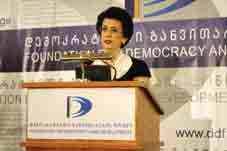Burjanadze wants Saakashvili to answer her questions
By Temuri Kiguradze
Friday, October 3

Burjanadze has distributed these questions to the Georgian media. Her document is sub-divided into five paragraphs relating to different geographical periods: prior to the war, starting the military action, conducting the military operations, the retreat of the Georgian Army and the post-war period.
The questions are posed in a very direct way. “Does the Government acknowledge that restoring Georgia’s territorial integrity has now become far more complicated that it was prior to the war, and that the resolution of this problem has been postponed for an indefinite period of time?,” asks the ex-Chair.
Concerning the possibility of Georgia having been able to avoid military action and protect its citizens, Burjanadze is demanding an explanation of why the Government has not made publicly accessible the following documents – the Medvedev-Sarkozy Agreement of 12 August (Russia-Georgia ceasefire agreement), the Clarifications to this Agreement, the letter of the Georgian President on non-resumption of hostilities and the letter the Georgian President sent to President Medvedev regarding Abkhazia (the so-called “Division of Abkhazia” letter).
“As all parts of society have to acknowledge the problems, information about them should be disseminated openly,” Nino Burjanadze stated. “The authorities claim that they have answers to all the questions, so we expect them to give these answers publicly within the next few days,” she added.
President Saakashvili, talking to the journalists on the same day, has stated that the questions the opposition have about the August war “are natural” and he is ready to answer them. “A person is judged according to the results of his actions. If society considers that a person is unable to fulfil the responsibilities of Government, that person should not hold the levers of Government,” the Georgian President said at a briefing in Tbilisi, in response to questions about strong criticism expressed by other former Government members, including former Prime Minister Zurab Nogaideli and Erosi Kitsmarishvili, a former Georgian Ambassador to Russia and close confidante.
Saakashvili has declared several times that he accepts full responsibility for the August conflict and that he is also responsible for further developments in the country. These statements may answer one of Burjanadze’s questions: “Who should be held responsible for the political, military and economic consequences of the war?” However Saakashvili still has to answer the question that is last but not least in Burjanadze’s list – “Does the Government acknowledge having been defeated in the war, and will subsequent strategic decisions be made on the basis of this acknowledgment?”
Nino Burjanadze was one of the leaders of the 2003 Rose Revolution and had been the Speaker of the Georgian Parliament since 2001 when she left in 2008. She has a degree of Associate Professor of Law. Although a member of the governing National Movement Party, she refused to participate in the parliamentary elections of May 2008, where she was supposed to have led the party’s candidates list, and left active politics. She has subsequently founded her own non-governmental organization called the Foundation for Democracy and Development (FDD).
Burjanadze’s October 1 statement had been preceded by a briefing on September 12 in which she demanded that the authorities “give a competent and justified answer to the question of whether or not it was possible to have averted [the war].” Asked whether she would join the opposition parties in demanding the resignation of the President and early Presidential and Parliamentary elections, she answered that her final position “will depend on how adequately the authorities act and how adequately they respond to the country’s current reality.” Burjanadze has served as the Acting President of Georgia twice, directly after the Rose Revolution in 2003, replacing Eduard Shevardnadze, and in 2007, replacing Mikheil Saakashvili during the early Presidential elections.
“The questions posed by Nino Burjanadze are absolutely logical,” said independent Georgian political commentator Gia Khukhashvili, talking to The Messenger. He welcomed the decision of the ex-Speaker to address them to the Government. Being asked about the possibility of Burjanadze joining the active opposition Khukhashvili pointed out that that it would be “difficult” for her. “It’s good that she [Burjanadze] has posed 43 question to Saakashvili, but she herself has to answer the 43 questions that were not answered during her time as Speaker of the Parliament,” said Khukhashvili, saying that Burjanadze has to clarify her role in the political crisis of November 2007 which led to the early elections. “I still remember her saying that the Government “had the right” to close Imedi [opposition TV channel],” he said. Khukhashvili also remembered that in summer 2008 Burjanadze accepted a gift from Georgian government – a large plot of land in a desirable location near Tbilisi. “A person who wants to call him/herself a member of the opposition has to earn the trust of society,” he said.
